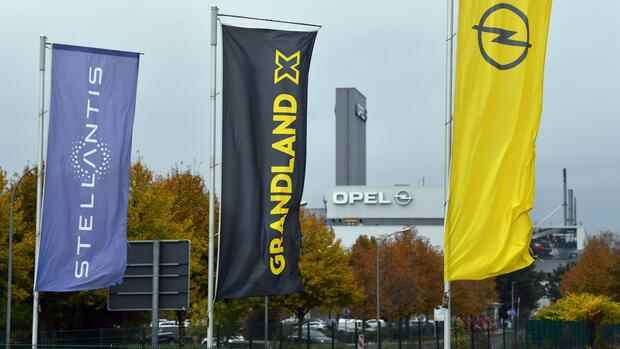The plant, which currently employs around 1400 people, is to be spun off into its own company. The factory is to remain docked with Opel in Germany.
(Photo: dpa)
Munich Adapt or die: That is the Darwinian business maxim of Stellantis boss Carlos Tavares. The manager is considered to be perhaps the toughest cost killer in the auto industry. The Portuguese with a French passport has been cracking down on the German subsidiary Opel for years and is gradually having thousands of jobs cut in order to increase efficiency.
But Tavares has now failed with his latest plan to remove Opel from legal responsibility for its own factories. As Stellantis admitted on Wednesday, the conglomerate that emerged from Peugeot SA and Fiat Chrysler is moving away from the idea of separating the Opel parent plant in Rüsselsheim from Opel Automobile GmbH and transferring it to an independent company.
Stellantis and the IG Metall union have also found a solution for the factory in Eisenach. The plant, which currently employs around 1400 people, is to be spun off into its own company. Unlike Tavares originally planned, the factory is to remain docked with Opel in Germany instead of being transferred to a Stellantis unit. Management and the union have agreed on this.
“The spin-off and break-up of Opel could be prevented and employment secured,” explained Jörg Köhlinger, head of the Mitte district at IG Metall. “I hope that the management will steer the company more constructively and transparently in the future and that from now on Opel will only inspire employees and the public with innovative vehicles.”
Top jobs of the day
Find the best jobs now and
be notified by email.
The employee representatives have also agreed with the management that production of the Grandland will start again in Eisenach in the first week of January. The tapes in the plant are currently dormant due to the lack of chips. “This is excellent news for the Opel brand. Because with the new Grandland we have a state-of-the-art, electrified SUV flagship that is very popular with our customers, ”explained Opel boss Uwe Hochgeschurtz. The former Renault manager did not say a word about the originally planned outsourcing of the factories.
External effects and homemade problems
The U-turn by Opel in the planned dismemberment is probably a reaction to the fierce criticism from employees, politicians and trade unionists in Germany. After the Handelsblatt unveiled Tavares’ internal considerations at the beginning of October, IG Metall, for example, criticized the request “in the strongest possible way”.
The industrial union even spoke of an impending “break-up” and accused Stellantis of willfully endangering jobs and locations. The Opel works council also warned against an “escape from co-determination” and announced resistance. At the end of October, thousands of Opel employees protested against the management’s plans and for maintaining the brand as a unit.
Even the Prime Ministers of Hesse, Thuringia and Rhineland-Palatinate spoke up. In a joint letter to Stellantis boss Tavares, Volker Bouffier (CDU), Bodo Ramelow (Die Linke) and Malu Dreyer (SPD) expressed their concern about developments at Opel and called for a personal discussion at the highest level.
Overall, the situation at Opel is tense. Like the rest of the industry, the vehicle manufacturer is suffering massively from the consequences of the corona pandemic and the semiconductor shortage. But there are also homemade problems. The market share of Hessen in the core market of Europe has fallen from 5.5 to 4.2 percent in the past two years alone.
In Eisenach, due to the chip bottleneck, short-time work will continue until at least the end of the year; In Rüsselsheim, management and works council are arguing about the imminent closure of several parts of the plant. And the planned reduction of 2100 jobs by the end of the year will stall.
More: Opel boss Hochgeschurtz wants to shorten the delivery time of e-cars significantly
